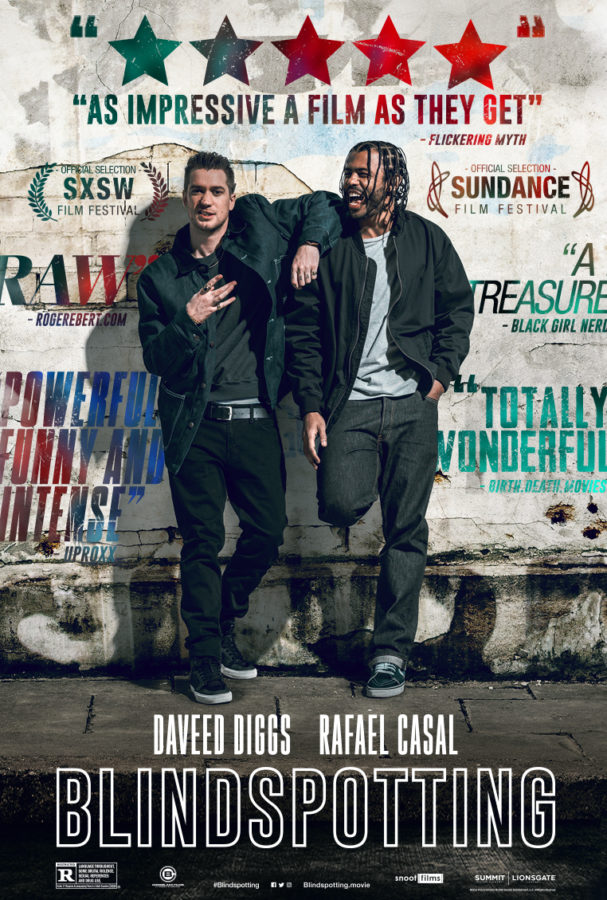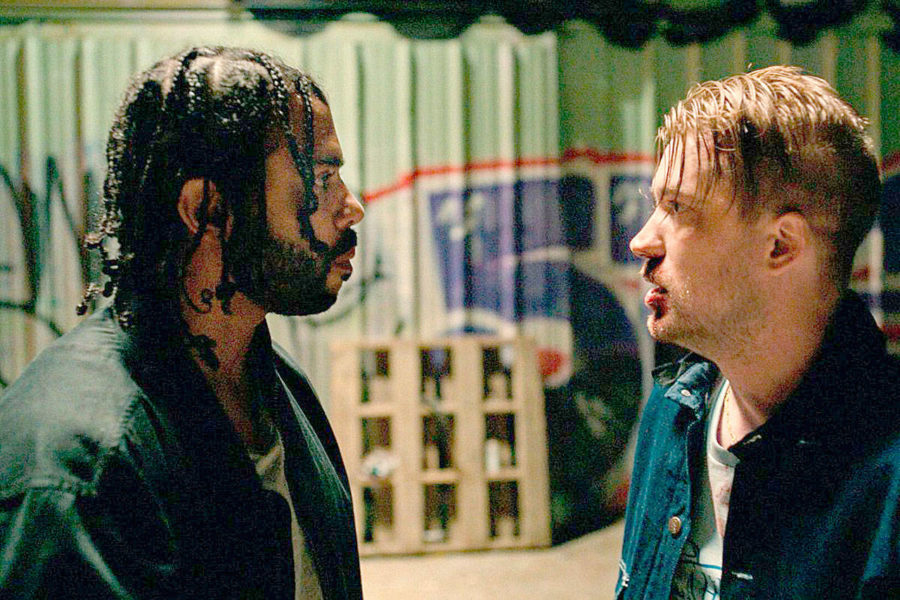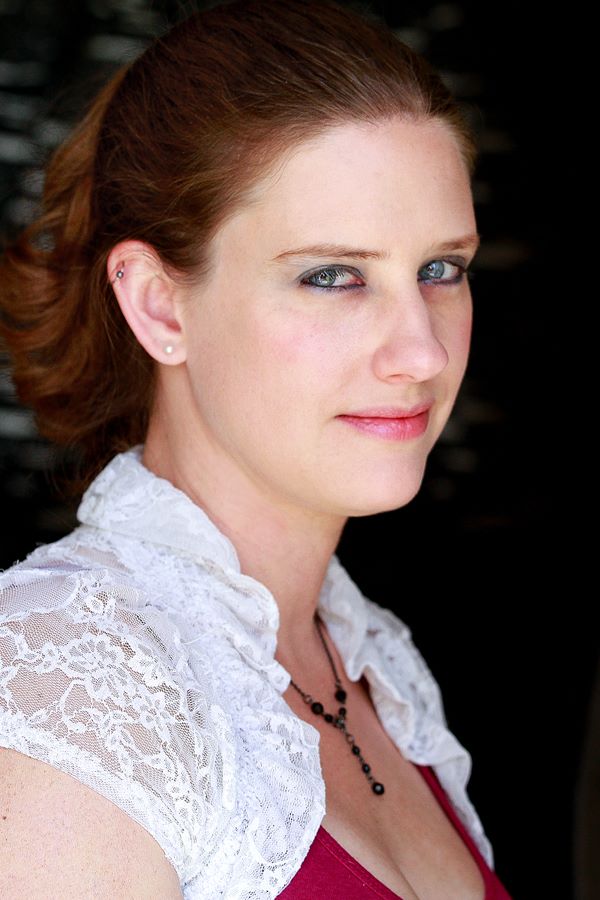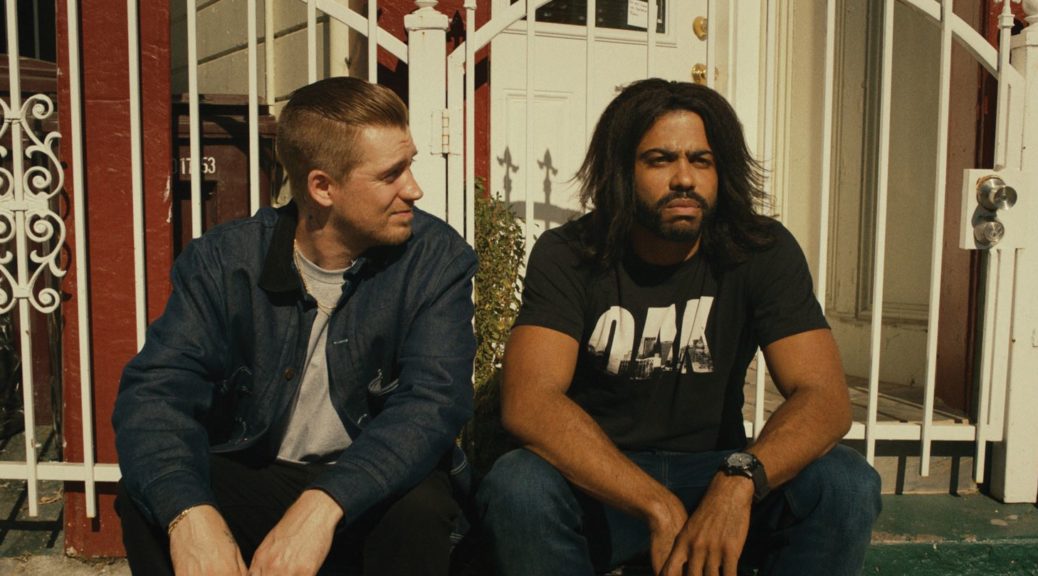Last night I watched BLINDSPOTTING.
Written by its stars, Daveed Diggs and Rafael Casal, and directed by Carlos Lopez Estrada, this 2018 film is about a black man and convicted felon at the end of his probation, trying desperately to avoid trouble in Oakland while his white best friend tries as hard as he can to start it.
I know this column, which I cruelly abandoned a few months ago with every intention of getting back to it soon (I AM going to finish my opus on 50 Shades), is supposed to be primarily about directors, so I’ll give a nod to Estrada, who cut his teeth on short films, music videos, and TV episodes before being given BLINDSPOTTING as his feature debut, so although he’s not a household name, he had a ton of experience before he walked onto this set, and this film appears to have raised his profile.
And I know I usually try to talk about the aesthetics of a film, and the technicalities of filmmaking on display. Usually I take notes while I watch a film for this column, and note camera angles and costume and color, and whatever else catches my eye. But I didn’t intend to talk about this film today. I didn’t watch it with an academic eye.

That doesn’t mean I didn’t notice the style. This film is very clever, with a few creative camera angles and editing choices that give it a unique voice but never feel like showing off because they always serve the story. It moves at a smooth pace, anchored by a series of improvised raps that start as a fun activity and end with a poignant moment of choice. So I noticed how well the film was shot, but I wasn’t focused on it. I was just watching a film as a regular old person.
But yesterday, the big story was a white woman who called the cops on a black man and used a hysterical tone of voice as she described how he was attacking her as he calmly filmed her from a safe distance. Her life is being ripped to shreds right now, and rightly so. That’s what should happen to every white person tries to weaponize racism and get black people killed, arrested, or just living in fear.
Then this morning, I woke to a video of a black man being held down by a police officer with a knee on his neck, saying he couldn’t breathe until he died. We all talked about Eric Garner for so long, and so loudly, and where did it get us? Nothing has changed. Police are a tool of fear to wield against the black community. They’re supposed to help people. They’re supposed to provide safety and hope and relief. But for black Americans, they’re a boot on the neck of people who are just trying to live.
So I’ve been thinking a lot this morning about BLINDSPOTTING and how good it is. Even though the subject matter is so serious, it’s a delight to watch! It’s on HBO right now, so if you’ve got HBO, it’s worth an immediate watch. If you don’t, it’s worth the cost to rent.
SPOILERS AHEAD!

This film is NOT a story about a black man’s suffering. So often, these stories are about brutalizing black people: Regardless of the intent, by the end of the film, we’re heartbroken by a man’s death at the hands of racism.
But that’s not this story. This film is so much more complex than that. It’s about Collin’ (Diggs) fear, his helplessness, and his decisions about what to do when confronted with tests. He’s tested every day with fight or flight – every day – and it’s exhausting. I spent the whole movie waiting for the moment when he’d be shot, because that’s what we’ve come to expect from films of this kind.
Meanwhile, his white friend Miles (Casal) just stomps through life, causing chaos wherever he goes, and leaves Collin to clean up the mess. Miles isn’t a bad person, and he’s not racist, but he’s blind to how much his privilege as a white man allows him to skate past the consequences of his actions – the same consequences Collin is constantly forced to pay.
So what’s great about this film is that it ISN’T about the inevitable death of a black man at the hands of racism. Two white men are confronted with their privilege in this film, and BOTH of them have a realization about it. It doesn’t treat white people as the unchangeable enemy, but as people who haven’t ever been forced to consider their own internalized bias. And one important thing that happens in this film is a lesson to all of us white Americans: After Miles recognizes how blind he’s been, he turns it around on another white person. It’s just one line, but it’s a moment where one white person is using what he’s learned. He refuses to let the other white person off the hook as he’s looking for sympathy, and the film implies that he will see things differently from now on, now that he’s seen the truth he was blind to for so long.
This is so significant. It’s not the job of black Americans to educate us. It’s our job to examine our bias and to PASS IT ON. If you see white bullshit, you say something. I know from experience that nothing stops dudes from harassing women faster than their buddies speaking up and telling them to stop, and nothing stops racism faster than white people calling out our friends when they say dumb shit that betrays their bias.

BLINDSPOTTING, at its core, is about hope that we can get beyond this. By the end of this film, EVERYONE has seen beyond their blindspot and Collin gets out of it alive, implying that maybe if we all just turn a mirror on ourselves, we can see the truth we’ve been avoiding.
So today, as another black man has been murdered by police just as one white lady has learned that there’s a consequence for weaponizing racism, BLINDSPOTTING is so very relevant. Please watch it, and enjoy it as I did, as a regular old watcher of movies and not an academic. Then, if you’re white, sit down with yourself in a quiet place and figure out how you can do better. Because we can all do better. We have to.

Emily Blake writes screenplays with lots of fight scenes. She is a vocal advocate for feminism, polyamory, kink, and sex positivity. She makes most of her money as a script supervisor for film and television, but she also makes cosplays for clients out of her little apartment in Los Angeles.


[…] 13th – Available on Netflix– Dear White People – Available on Netflix– Blindspotting – Available on […]